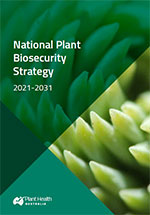Read the latest information on
Foot-and-mouth disease
 The 2021-2031 National Plant Biosecurity Strategy (NPBS) was released by Plant Health Australia and (PHA) provides a framework to strengthen Australia’s plant biosecurity system over the next decade.
The 2021-2031 National Plant Biosecurity Strategy (NPBS) was released by Plant Health Australia and (PHA) provides a framework to strengthen Australia’s plant biosecurity system over the next decade.
The second-generation strategy outlines four focus areas needed to build a resilient and contemporary national plant biosecurity system that will continue to support Australian plant industries, economy, environment and communities.
“Plant biosecurity risks are mounting as is the challenge of maintaining Australia’s pest free status,” says PHA Chief Executive Officer, Sarah Corcoran. “The strategy sets the direction for activities across the system and drives the way for effective collaboration and action by governments, plant industries and the community to protect our producers and the end-to-end supply chain.”
Designed to inform investment across all aspects of the system, guide efforts to address the most important priorities and effectively manage current and future biosecurity challenges, the updated NPBS builds on the achievements of the 2010-2020 strategy while remaining agile and responsive to the changing biosecurity environment.
The Australian Government Department of Agriculture, Water and the Environment (DAWE) will fund PHA to coordinate a National Plant Biosecurity Strategy Implementation Group to oversee implementation of the strategy.
DAWE’s Chief Plant Protection Officer, Dr Gabrielle Vivian-Smith, said the investment recognised the importance of effective coordination to successful implementation of the strategy.
“Delivery of the strategy requires collective effort nationally. The implementation group will play a key role aligning efforts of participants across our system and highlights PHA’s strong record bringing stakeholders together,” Dr Vivian-Smith said.
Australia’s Chief Environmental Biosecurity Officer, Dr Robyn Cleland said the strategy recognises the importance of protecting Australia’s environmental assets and highlights the value of collaboration between industry and the community.
“Community awareness and participation are critical in an effective biosecurity system. We all have a role to play in protecting our unique environment and way of life”, Dr Cleland said.
Development of the strategy was informed through consultation with a wide range of stakeholders, including governments and plant industry bodies as well as environmental and community groups.